|
|
|
Sort Order |
|
|
|
Items / Page
|
|
|
|
|
|
|
| Srl | Item |
| 1 |
ID:
124315


|
|
|
|
|
| Publication |
2013.
|
| Summary/Abstract |
The paper considers the extent to which domestic regional policy in the Central East European EU member states has been 'subsumed' into cohesion policy approaches. It acknowledges that directions of domestic regional policy change vary with processes of EU policy transfer, adaptation, emulation or resistance. This variation occurs across time and across member states. Crucially, the paper argues that interaction between cohesion policy and national regional policy systems also varies according to different regional policy components. Drawing on research from across the member states, the analysis breaks policy down into a number of key dimensions (objectives, instruments, spatial targeting and governance) and assesses the interaction between EU and domestic approaches and agendas.
|
|
|
|
|
|
|
|
|
|
|
|
|
|
|
|
| 2 |
ID:
138120


|
|
|
|
|
| Summary/Abstract |
This paper argues that policy space ownership dynamics, political and historical institutional variables determine the implementation of reforms advocated within the context of the international transfer of public sector reform models to Africa. Through the case of the Malawi Hospital Autonomy reforms, this paper demonstrates that although policies transferred by international donor organisations to African countries through aid conditionality may be initially adopted so as to secure the much-needed developmental aid, the actual implementation of such reforms is not an automatic process. This is due to contextual factors, which in part include the neo-colonial struggle for policy ownership in the face of conditionality, path dependency tendencies and veto players that are constrained by deeply entrenched political and historical institutional proclivity that lead to policy stability even in the context of coercive policy transfer pressures. Taking a qualitative approach, the analysis combines the use of primary and secondary data. The study findings show that while other African countries successfully implemented such reforms, Malawi has not, due to specific implementation, historical, political and institutional factors.
|
|
|
|
|
|
|
|
|
|
|
|
|
|
|
|
| 3 |
ID:
059112
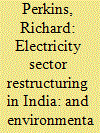

|
|
|
| 4 |
ID:
167124


|
|
|
|
|
| Summary/Abstract |
In today’s world, globalization and internationalization of education necessitate new initiatives to catch the new era. Turkey, as a country in between the east and the west, attempts to do so through its recent exchange program in higher education. Interestingly, Turkey’s Mevlana exchange program as an ambitious project in higher education denotes an instance of policy transfer: taking the EU model (i.e., Erasmus) and slightly adjusting it to the national circumstances. This article unpacks Turkey’s Mevlana program to demonstrate the process of policy transfer by focusing on different questions posed within the policy transfer literature. It argues that Mevlana is drawn from Erasmus, and it is created as a tool of soft power that is increasingly exercised by Turkey due to its changing focus within the Turkish foreign policy of 2000s.
|
|
|
|
|
|
|
|
|
|
|
|
|
|
|
|
| 5 |
ID:
175057
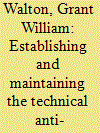

|
|
|
|
|
| Summary/Abstract |
Scholars have sought to explain how and why developing countries establish anti-corruption agencies by examining the strength of national and international institutions, particularly political institutions and actors, international donors and civil society. This article argues that these explanations are inadequate and that explaining the nature of anti-corruption reform in developing countries requires accounting for the transnational technical anti-corruption assemblage. This assemblage comprises individuals, ideas and things that reinforce technical solutions to corruption. This article examines the case of anti-corruption reforms in Solomon Islands during and after the international Regional Assistant Mission to Solomon Islands (RAMSI) intervention (2003–2017). It shows that parliamentarians passed anti-corruption reforms despite declining pressure from donors, relatively weak civil society and wavering political commitment. The article suggests a transnational coalition of national and international actors and objects helped establish and maintain a technical anti-corruption assemblage. Through exclusionary practices, this assemblage helped maintain the technical and apolitical nature of anti-corruption reform. Findings provide insights into the effectiveness of anti-corruption ‘policy transfer’ in Solomon Islands and other developing countries.
|
|
|
|
|
|
|
|
|
|
|
|
|
|
|
|
| 6 |
ID:
163423


|
|
|
|
|
| Summary/Abstract |
This article investigates EU–China dialogue on regional policy, a puzzling exercise in policy transfer because such policy is by its nature inward-oriented and the intricacies of regional development imply uncertainty about its effects in different contexts. The article sheds light on the reasons of both sides for engaging in this unlikely policy learning effort and identifies its actors and mechanisms. It also critically assesses this process, stressing its one-way nature and the active role of the EU as a ‘policy-sender’, in contrast to most policy transfer literature citing demands by the policy-recipient as the predominant reason to engage in such cooperation.
|
|
|
|
|
|
|
|
|
|
|
|
|
|
|
|
| 7 |
ID:
077388
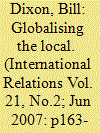

|
|
|
|
|
| Publication |
2007.
|
| Summary/Abstract |
A framework for analysing policy transfer developed by David Dolowitz and David Marsh has begun to attract the attention of criminologists interested in understanding how crime policies travel. This article uses this framework to assist in tracing the genealogy of a style of local, geographically responsible `sector' policing which is currently being implemented by the South African Police Service. After locating sector policing as a distinctive approach within the broader tradition of community policing, the article considers the origins and development of geographically responsible policing in Great Britain and the United States before focusing on its adoption and adaptation in post-apartheid South Africa. Answers to the seven questions suggested by Dolowitz and Marsh's framework are then sought in an effort to understand more fully the genealogy of sector policing in South Africa and the role of international policy transfer in it.
|
|
|
|
|
|
|
|
|
|
|
|
|
|
|
|
| 8 |
ID:
167011


|
|
|
|
|
| Summary/Abstract |
Energy policies play an important role in accelerating ‘sustainable transitions’ by enabling and incentivizing investment in electricity generation from renewable sources. Key policies such as feed-in tariffs, tradable permits and auctions were pioneered in OECD nations, notably within the European Union, and in recent years have been the subject of donor-funded projects to transfer such policies to lower-income countries. However, within the wider transition studies literature, there is a lack of detailed understanding regarding the process of how this policy transfer takes place in the renewable energy sector. Our research addresses this gap by analyzing the micro-politics and actor-strategies by which the GETFiT program was implemented in Uganda. In particular, we focus on the interplay of transnational and national actors in pursuit of specific policy objectives. Informed by case study method and qualitative research, we employ theoretical perspectives, archival data sources and semi-structured interviews to adapt the policy transfer framework to the agency perspective of policy translation. We find that transnational influences, resource flows, local embeddedness, and institutional resilience are all necessary prerequisites for a coherent policy outcome. Moreover, this study opens up an avenue of research into co-creation processes and relational perspectives in sustainasbility transitions.
|
|
|
|
|
|
|
|
|
|
|
|
|
|
|
|
| 9 |
ID:
156097
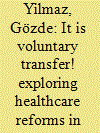

|
|
|
|
|
| Summary/Abstract |
The Turkish healthcare system has been transformed in the 2000s by adopting a comprehensive health model – the so-called Turkish Model. Although Europeanization dynamics were effective in Turkey in recent decades due to the acceleration of European Union (EU) accession process after 1999, healthcare reforms demonstrate a distinct process. This article analyzes the factors behind the health transformation through employing a policy transfer framework. It argues that a parallel process of health-policy transfer with Europeanization in other areas emerged in Turkey, and rather than the EU push, the Turkish healthcare model was a result of voluntary engagement for eliminating problems in this domain.
|
|
|
|
|
|
|
|
|
|
|
|
|
|
|
|
| 10 |
ID:
111682
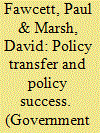

|
|
|
|
|
| Publication |
2012.
|
| Summary/Abstract |
Policy transfer has become a crucial aspect of the contemporary world of policy-making. However, the relationship between the actual process of policy transfer and the 'success' of policy outcomes generated by that transfer is an under-researched area. This article addresses the following key question: what factors affect the success, or otherwise, of policy transfer? This question is explored using a putatively successful case of policy transfer, the Gateway Review process between 2001 and 2010, focusing particularly on three of the early transfers of this process from the UK to Victoria and then to the Commonwealth level and New South Wales in Australia.
|
|
|
|
|
|
|
|
|
|
|
|
|
|
|
|
| 11 |
ID:
175822
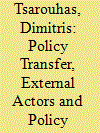

|
|
|
|
|
| Summary/Abstract |
Turkey’s economic turmoil of today is reminiscent of an earlier era, during which instability, high inflation, and financial mismanagement ruled the day. Yet until recently, Turkey was celebrated as an economic success story, enjoying rising prosperity, high GDP growth, and a healthy fiscal outlook. How was that success possible? Which mechanisms allowed for successful policy reform and how did internal reform dynamics interact with exogenous factors? This article examines the effects of EU and IFI policy conditionality on Turkey, arguing that EU-induced conditionality is more effective compared to IFI conditionality. Further, this work demonstrates the formation of a domestic epistemic community, which evolved into an advocacy coalition and became a crucial pillar for policy reform. Finally, shrewd policy entrepreneurs used a favorable window of opportunity and aligned with the reformist coalition to overcome barriers to policy change.
|
|
|
|
|
|
|
|
|
|
|
|
|
|
|
|
| 12 |
ID:
131787
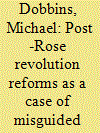

|
|
|
|
|
| Publication |
2014.
|
| Summary/Abstract |
This article traces political and institutional developments in the Republic of Georgia after the Rose Revolution. Particular focus is placed on efforts by Georgian policy-makers to align Georgian political institutions with Western models. Drawing on the concept of policy transfer, the author demonstrates various pitfalls in this process. Based on the gathered evidence, it appears that Georgian policy-makers engaged in various processes of 'incomplete transfer', compounded by a lack of understanding or deliberately false conceptions of Western institutions. Despite democratic rhetoric and interlinkages with the West, Georgia moved to a novel form of 'hyper-presidentialism' and dismantled institutional checks and balances. Hence, the Rose Revolution initially served to reinforce the already existing institutions of 'patronal presidentialism' through a series of misguided institutional modifications. The author also discusses the outcome of the recent parliamentary and presidential elections, which may have ironically and accidentally further democratised the country.
|
|
|
|
|
|
|
|
|
|
|
|
|
|
|
|
| 13 |
ID:
180251
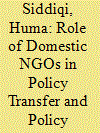

|
|
|
|
|
| Summary/Abstract |
Pakistan is a fragile democracy repeatedly facing problems in the design and implementation of police reforms. The scholarship on public policy highlights the role of non-state actors like NGOs in improving policies, especially through policy transfer and diffusion. In 2002, Pakistan designed a police reform, PO 2002, through collaborative methods, and implemented it nationwide for a short time. Using process tracing within case study and interviews with key informants, this article evaluates the role of domestic NGOs in the design, implementation and change of PO 2002, with special focus on policy transfer and policy diffusion. The evidence collected showed that in 2000, the nascent NGOs lacked expert knowledge to make any contribution to policy transfer. Later, their absence from the implementation phase and faulty methods blinded them from unveiling the critical policy lessons and impeded their ability to play any credible role in future policy diffusion.
|
|
|
|
|
|
|
|
|
|
|
|
|
|
|
|
| 14 |
ID:
149746


|
|
|
|
|
| Summary/Abstract |
The “Singapore model” constitutes only the second explicit attempt by the Chinese Communist Party (CCP) to learn from a foreign country following Mao Zedong's pledge to contour “China's tomorrow” on the Soviet Union experience during the early 1950s. This paper critically evaluates policy transfers from Singapore to China in the post-Mao era. It re-examines how this Sino-Singaporean regulatory engagement came about historically following Deng Xiaoping's visit to Singapore in 1978, and offers a careful re-reading of the degree to which actual policy borrowing by China could transcend different state ideologies, abstract ideas and subjective attitudes. Particular focus is placed on the effects of CCP cadre training in Singaporean universities and policy mutation within two government-to-government projects, namely the Suzhou Industrial Park and the Tianjin Eco-City. The paper concludes that the “Singapore model,” as applied in post-Mao China, casts institutional reforms as an open-ended process of policy experimentation and adaptation that is fraught with tension and resistance.
|
|
|
|
|
|
|
|
|
|
|
|
|
|
|
|
| 15 |
ID:
192607


|
|
|
|
|
| Summary/Abstract |
This article retraces and reconstructs the process of developing and launching the European Union’s Military Mobility project. Situated in the agenda-setting and policy-transfer literature, this article explicates the establishment and implementation of the Military Mobility project and helps to explain the entire policy and development process around the Military Mobility initiative to date. By drawing on process tracing, this article methodologically unpacks the process surrounding this policy development at the EU level. The results show that the European Commission has expanded its competences within the defence field by purposefully and politically acting upon the worsened security situation in and around Europe, while actively building coalitions and managing good working relations with the actors involved in the project. Moreover, the findings show that the EU services have learned from NATO in the defence domain. Thus, this analysis contributes to a greater understanding of the new role of the European Commission in the field of EU security and defence policy.
|
|
|
|
|
|
|
|
|
|
|
|
|
|
|
|
| 16 |
ID:
123028
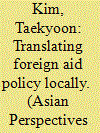

|
|
|
|
|
| Publication |
2013.
|
| Summary/Abstract |
In this article I consider the links between foreign aid and policy transformations in aid-receiving countries, with a particular reference to the South Korean modernization process. The main analytical points concern not only how to identify foreign aid policy affecting Korea's modernization projects in the period of state building but also how to interpret the role of local partners in dealing with international aid transfers. I assert that policy transfers in the aid industry cannot be successfully completed without the consideration of policy takers' reflective translation of foreign aid in the local contexts. The Korean experience presents a proactive pattern of policy translation (reflecting local autonomy in dealing with foreign aid), rather than policy transfer (reflecting the implantation of donor-driven aid projects), by situating international policies in the local context with strong ownership and commitment. Indeed, the substantive path of policy transfers is viewed as a social construct that reflects local partners' strategic interests and development planning.
|
|
|
|
|
|
|
|
|
|
|
|
|
|
|
|
| 17 |
ID:
147645
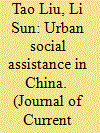

|
|
|
|
|
| Summary/Abstract |
In 1999 the State Council of the People’s Republic of China (PRC) introduced the Regulation on the Minimum Living Standard Scheme(MLSS, 低保 or dibao) for urban residents in China. Policy learning from different parts of the world significantly shaped the formation and expansion of the MLSS, and Chinese social policy researchers have drawn conclusions about the experiences of these multiple regions. Through expert interviews, we discovered that the Chinese social assistance scheme has been influenced by the US ideas of “social investment” and “workfare.” Furthermore, the European values of “universal entitlement” and “social citizenship” have also been internalised by the Chinese actors behind the scheme. In addition, Hong Kong’s social assistance scheme has inspired Chinese policymakers to explore a model consisting of various categories that target the country’s enormous special welfare needs. Thus, scholars and policymakers from China have used values and ideas outside China to create a hybrid model of social assistance that is characterised by broad coverage, a low benefit level, and a highly provincial administrative structure.
|
|
|
|
|
|
|
|
|
|
|
|
|
|
|
|
|
|
|
|
|